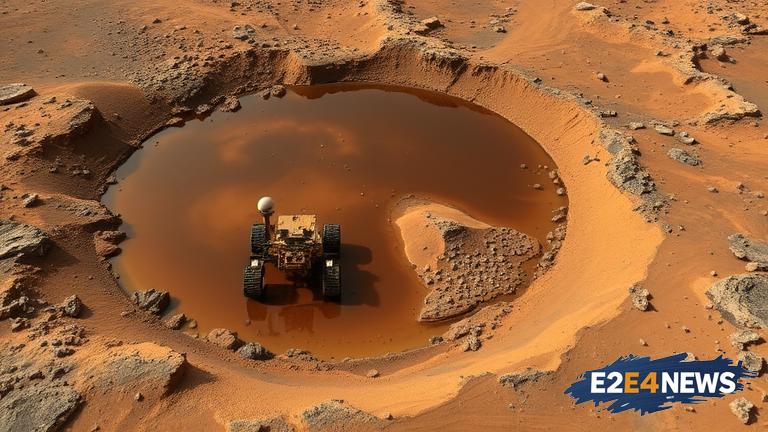NASA’s Perseverance rover has made a groundbreaking discovery on Mars, uncovering evidence of an ancient lake that once existed on the planet. The rover, which has been exploring Mars since February 2021, has been studying the Jezero crater, a 45-kilometer-wide impact crater that is believed to have formed around 3.5 billion years ago. The crater is thought to have once been home to a lake, and the rover’s findings have confirmed this theory. The evidence of the ancient lake was discovered in the form of sedimentary rocks, which are rocks that are formed from the accumulation of sediment, such as sand and mud. These rocks are a key indicator of the presence of water, and the rover’s discovery has provided new insights into the planet’s past and potential for life. The Perseverance rover is equipped with a range of instruments, including cameras, spectrometers, and a drill, which have allowed it to study the Martian geology in unprecedented detail. The rover’s findings have been published in a series of papers, which have shed new light on the Martian environment and the potential for life on the planet. The discovery of the ancient lake is significant, as it provides evidence of a past environment that could have supported life. The lake is thought to have been around 100 meters deep and would have covered an area of around 20 square kilometers. The rover’s findings have also provided new insights into the Martian geology, including the discovery of ancient river systems and lakebeds. The Perseverance rover is part of NASA’s Mars Exploration Program, which aims to explore the Martian surface and search for signs of life. The program has been ongoing since the 1990s and has included a range of missions, including the Curiosity rover, which has been exploring Mars since 2012. The Perseverance rover is the most advanced rover to have been sent to Mars, and its discoveries have provided new insights into the planet’s past and potential for life. The rover’s findings have also sparked new interest in the search for life on Mars, with many scientists believing that the planet could have supported life in the past. The discovery of the ancient lake has also raised questions about the potential for life on other planets, and the possibility of finding evidence of life beyond Earth. The Perseverance rover will continue to explore Mars and search for signs of life, and its discoveries will be closely watched by scientists and the public alike. The rover’s mission is expected to last for several years, and its findings will be used to plan future missions to Mars. The discovery of the ancient lake is a significant milestone in the search for life on Mars, and it has provided new insights into the planet’s past and potential for life. The Perseverance rover’s findings have also highlighted the importance of continued exploration of the Martian surface, and the need for further research into the planet’s geology and potential for life. The search for life on Mars is an ongoing area of research, and the Perseverance rover’s discoveries have provided new hope for finding evidence of life beyond Earth. The rover’s findings have also sparked new interest in the possibility of sending humans to Mars, with many scientists believing that the planet could be a potential destination for future missions. The discovery of the ancient lake has also raised questions about the potential for life on other planets, and the possibility of finding evidence of life beyond our solar system. The Perseverance rover’s mission is a significant step forward in the search for life on Mars, and its discoveries will be closely watched by scientists and the public alike. The rover’s findings have provided new insights into the Martian environment and the potential for life, and have highlighted the importance of continued exploration of the Martian surface.
